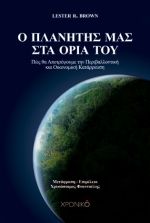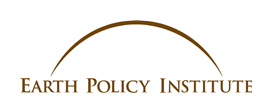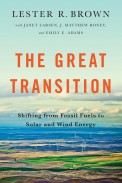Wednesday, December 21, 2011
We realize that it will take an enormous dissemination effort to guide the global transition to a Plan B economy. Thus, at the Institute we work through a combination of a worldwide network of media contacts, publishers, and the Internet to reach a global audience. We also hold press teleconferences to draw special attention to some of the issues. 
Publishing and Book Releases
Books are the foundation for which we reach a global constituency. Thus far, our books have been published in 31 languages. Major languages (more than 50 million speakers) include English (three publishers: US & Canada, UK & Commonwealth, India & South Asia), Arabic, Chinese (two publishers: Mainland and Taiwan), Farsi, French, German, Hindi, Indonesian, Italian, Japanese, Korean, Marathi (India), Polish, Portuguese (Portugal and Brazil), Russian, Spanish (Latin America and Spain), Thai, Turkish, and Ukrainian. Other languages include Bulgarian, Catalan, Danish, Hungarian, Norwegian, Romanian, Slovenian, and Swedish. The three new languages this year—Dutch, Greek, and Vietnamese—brought the number of contracts to 122.
Two weeks after launching the U.S. edition of World on the Edge, Lester Brown was launching the UK edition in London and at Oxford University. He also launched the book a few months after that in Brussels at the European Parliament. In Boston and Cambridge, Lester gave presentations at Harvard’s Center for the Environment and the Cambridge Forum, which was taped and aired at a later date. He was also interviewed by Bloomberg TV and NPR’s Living on Earth. Other nationwide radio programs included the BBC, Leonard Lopate, The Nation, NPR’s Fresh Air, Science Friday, PRI, and Greenpeace radio.
In the fall, he released the Dutch edition of World on the Edge (We kunnen nog kiezen) in The Hague, the French edition, Basculement, in Lyons, Lille, Cergy, and Paris, and the Korean edition in Seoul and Gwangju.
Other notable presentations that Lester gave were at Columbia University’s Earth Institute’s 17th Annual International Sustainable Development Research Conference, the Forum for the Future of Agriculture in Brussels, the Consumer Good’s Global Summit in Barcelona, the World Conference on Disaster Management in Toronto, and a presentation in Tokyo for the Asahi Glass Foundation which was celebrating its twentieth anniversary of the Blue Planet Prize, which Lester had received in 1994. He also spoke at the World Bank, the Inter-American Development Bank, the Foreign Agricultural Service, and the WWF Kathryn Fuller Science for Nature Symposium in DC.
One of the most exciting conferences Lester participated in was in The Netherlands in September where he saw a Plan B pension fund becoming a reality. He met with managers of three major investment companies, with combined assets of nearly $1 trillion, whose goal was to design such a fund. A month later, the CEOs of these funds agreed to launch the fund. This process began last year with Marcel de Berg, who, inspired by Plan B 3.0, used his position as an investment manager to begin the process of establishing a pension fund that would promote a Plan B economy. The idea may be spreading. Following this conference, Lester flew to Zurich to speak to a group of investment managers headed by Sustainable Asset Management, which was also part of the Plan B pension fund initiative.
Media Outreach
EPI works closely with the world's major news organizations. Since it began operation in May 2001, EPI has generated over 45,000 news clips, about 17 each weekday. Institute researchers have given some 600 interviews for radio and television, including national and international networks such as ABC, NBC, Bloomberg, the BBC World Service, Voice of America, CNN International, Al Jazeera, CCTV (China), NHK TV (Japan). In addition to the press teleconference releasing World on the Edge, EPI held four more press teleconferences on the issues of climbing world food prices, the geopolitics of food scarcity, the drop in carbon emissions in the United States, and if the United States could feed China. Each generated extensive media attention. More and more of the Institute’s research is posted on websites and discussed by bloggers.
Plan B Teams
With the original Plan B, over 700 individuals bought a copy, read it, and then became personally engaged, buying 5, 10, 20, or even 50 copies for distribution to friends, colleagues, and political leaders. They became EPI’s Plan B Team. The release of World on the Edge swelled the number of team members to some 4,000. Some members purchase copies and then return to purchase more. Ted Turner is the de facto captain with his distribution of some 4,200 copies to the Fortune 500 CEOs, state governors, Congress, university presidents, heads of state, ministers of environment, ministers of energy, ministers of agriculture, heads of the major environmental NGOs, the major media outlets, and, perhaps most importantly, to each of the world’s billionaires. Our thanks to all of you!
Website
We use a variety of online tools for our media outreach and communications marketing strategy to disseminate releases, data, and any information that our research team releases for the public. Included in these tools are blogs, RSS feeds, public and media listservs, networking sites, and a micro-blogging site. 
We also have an active < account, releasing 10 posts per week on average to promote events, our releases, and other interesting activities. Our Fan Page is also an active site. In fact, Twitter and Facebook are among the top referrals back to our website, along with international Google search engines and EPI’s Wikipedia page. When Googling for issues on which we work, the Institute is often at the top of the list due in large measure to the nearly 130,000 links to our website.
This year we have been live-tweeting its press conferences, providing an easily accessible channel for journalists. Prominent reporters and their affiliated news organizations have reposted our content, creating a multiplier effect of the outreach. Notable are reporters from Grist and the Guardian. Other notable organizations that re-tweet and re-post include Greenpeace USA, Beyond Coal, Quit Coal, National Geographic Green, 4H, Sustainablog, and Treehugger.
Unique in publishing, EPI posts its publications online for downloading the day of release, allowing free global access. Books are posted in PDF. Through October some 20,548 PDFs of World on the Edge and 25,998 of Plan B 4.0 were downloaded. In addition, previous editions of Plan B along with EPI’s other books are frequently downloaded, reinforcing the value of this free service. Data downloads generally exceed that of individual book chapters.
Through our blog, we try to give readers a look into the non-research part of our work, such as presentations, book tours, international publishers, and other events. For instance, in addition to the blogs on the world topping 7 billion and Lester’s gift of memorabilia to the Smithsonian's Museum of American History, another reflected back on the activities of the Institute’s first ten years, another some of the interesting people who had stopped by the office, while another the Institute’s newest arrival—Mandolyn Rose Larsen Brown.
Future Work
We have been heartened by the response we've had this year to the topics on which we work. Still, as evidenced by the political stalemate and corporate ill-will toward making positive change for the health of the planet--and therefore the health of all life on earth, there is a long way to go. We will be continuing to report on our progress toward a plan to save civilization, so stay tuned ... there’s a lot to look forward to in 2012!
Sincerely,
Reah Janise Kauffman
Page 1 of 1 pages


